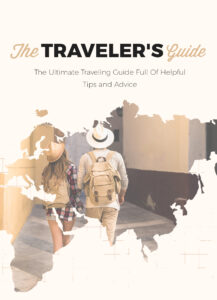How to Stay Healthy While Traveling Long Distances

Before diving in, please note: This post is for informational purposes only. If you’d like to know more about how we approach topics, feel free to check out our friendly Disclaimer Page.
Hey there, amazing readers! 🖐️ Just a quick note: yes, we know there are a lot of ads here. Trust us, we get it—it’s not the prettiest look, but they help us keep this blog alive and kicking. Those pesky little ads cover the costs of all the behind-the-scenes magic, from hosting and tech stuff to creating content we hope you’ll love.
We’re committed to delivering quality posts, and your support (even just sticking around despite the ads) means everything to us. So, bear with us, and thanks for helping us keep the good vibes rolling. Now, on to the fun stuff! 😉
TRANSLATE BUTTON AT THE END OF THE ARTICLE
Traveling long distances, whether for business, leisure, or an adventure, can be an exciting yet exhausting experience.
The anticipation of new places, cultures, and people is invigorating, but the strain of sitting for hours, dealing with jet lag, and managing your body’s needs on the go can take a toll on your health.
However, there are plenty of ways to ensure you stay in top shape during long trips.
Let’s dive into some simple, practical tips on how to stay healthy while traveling long distances.
1. Hydrate, Hydrate, Hydrate
The Importance of Water
When you’re on the move, especially during long flights or car rides, it’s easy to forget the most basic yet vital element: water.
Staying hydrated is key to maintaining your energy, avoiding dehydration, and supporting your body’s natural processes, especially when traveling in environments that may cause you to lose fluids (think: air conditioning on planes or hot, dry climates).
How to Do It: Carry a refillable water bottle with you.
Airports, bus terminals, and even train stations usually have places to refill, so take advantage of that.
Also, avoid drinking too much caffeine or alcohol, as these can dehydrate you further.
Why It Helps: Hydration supports everything from digestion to your immune system, and it can help combat symptoms like dry skin, headaches, or fatigue, which are common during long journeys.
2. Move Around Regularly
Stretch and Walk
Long hours of sitting, whether on a plane, train, or bus, can leave you feeling stiff and fatigued.
Sitting in one place for extended periods of time can also increase your risk of developing blood clots and other circulation issues.
That’s why regular movement is essential.
How to Do It: Take breaks to stretch your legs, walk around, or perform some light exercises every couple of hours.
On a plane, for example, get up to stretch or walk up and down the aisle.
If you’re in a car or bus, stop at rest areas and take a brisk walk for a few minutes.
Why It Helps: Movement helps improve circulation, reduces stiffness, and boosts your energy levels.
It also helps relieve tension in your muscles and supports your body’s natural detox processes.
3. Snack Smart
Pack Healthy Snacks
While traveling, it’s easy to fall into the trap of eating junk food, especially when you’re hungry and the only available options are fast food or airport kiosks.
But your body needs proper fuel to keep up with the demands of a long journey.
How to Do It: Pack healthy snacks that are easy to carry and eat on the go.
Think trail mix, fruit, yogurt, nuts, granola bars, or even a sandwich made with whole-grain bread.
These options will keep you satisfied without leaving you feeling sluggish.
Why It Helps: Healthy snacks provide your body with essential nutrients, fiber, and protein to keep you energized and prevent sugar crashes.
They also help maintain your metabolism and keep you from overeating when you finally sit down for a meal.
4. Protect Your Sleep Schedule
Beat Jet Lag and Fatigue
Long-distance travel, especially across time zones, can throw your sleep schedule out of whack and leave you feeling groggy, irritable, and exhausted. Jet lag is a common issue when traveling internationally, but it doesn’t have to derail your trip.
How to Do It: Try to adjust your sleep schedule a few days before your trip to match the time zone of your destination.
If you’re flying, take naps only when necessary and try to stay awake until it’s bedtime at your destination.
A sleep mask, earplugs, or noise-canceling headphones can help you sleep better on planes.
Why It Helps: Quality sleep helps your body recover, boosts your immune system, and improves your mood and focus.
Without proper rest, your body’s ability to fight off illness and cope with stress is diminished.
Discover "The Traveler’s Guide: Your Ultimate Companion for Every Adventure ✈️"

5. Keep Your Immune System Strong
Prevent Illness and Boost Immunity
Traveling often exposes you to different environments, air quality, and new people, all of which can expose you to viruses and bacteria.
This is especially true on planes, where the recycled air can be a breeding ground for germs.
A little prevention goes a long way in ensuring you don’t catch something on your trip.
How to Do It: Pack immune-boosting supplements like vitamin C, zinc, or elderberry, and eat foods rich in antioxidants and nutrients, such as fruits and vegetables.
Also, wash your hands frequently and avoid touching your face.
Carry sanitizing wipes to clean surfaces on planes or buses.
Why It Helps: A strong immune system helps your body fight off infections, reduces the likelihood of getting sick, and ensures that you feel your best throughout the trip.
6. Mind Your Posture
Support Your Body While Sitting
Long travel times often involve a lot of sitting, and poor posture can cause neck, back, or shoulder pain.
Ensuring that you’re sitting correctly during your journey can make a huge difference in how your body feels when you arrive at your destination.
How to Do It: Maintain good posture by keeping your back straight, your shoulders relaxed, and your feet flat on the floor.
If you’re in a car or plane, use a cushion or neck pillow to support your spine.
Adjust your seat or the position of your legs regularly to avoid stiffness.
Why It Helps: Good posture reduces the risk of aches, pains, and long-term injuries that can arise from sitting in one position for too long.
It also improves your circulation and digestion.
7. Dress Comfortably
Wear Clothes That Support Comfort and Mobility
What you wear on long trips can have a significant impact on how your body feels.
Tight clothes, uncomfortable shoes, or heavy fabrics can restrict circulation and add to your discomfort during long hours of travel.
How to Do It: Opt for loose, breathable fabrics and comfortable shoes that allow you to move easily.
Layer up to adjust to changes in temperature, especially on planes or trains where the air conditioning or heating can fluctuate.
Why It Helps: Comfortable clothing keeps you relaxed and allows your body to breathe.
Plus, it supports circulation and reduces the chances of developing conditions like swollen feet or deep vein thrombosis (DVT).
8. Be Mindful of Mental Health
Stay Calm and Stress-Free
Traveling long distances, especially to unfamiliar places, can trigger stress or anxiety.
Being away from home for extended periods can also lead to feelings of isolation or homesickness.
Maintaining good mental health is just as important as physical health while traveling.
How to Do It: Practice relaxation techniques like deep breathing, meditation, or mindfulness during your journey.
Take moments to disconnect, listen to calming music, or engage in light reading or journaling to reduce stress levels.
Why It Helps: A calm mind helps you maintain focus, keep your emotions in check, and enjoy your trip more.
Mental relaxation supports physical health and strengthens your body’s ability to cope with travel-related stress.
9. Prepare for Motion Sickness
Combat Travel Sickness
Whether you’re traveling by car, train, boat, or plane, motion sickness can be a common issue for many.
The dizziness, nausea, and discomfort can make long journeys miserable if you’re not prepared.
How to Do It: Bring along motion sickness tablets or natural remedies like ginger or acupressure wristbands.
If you’re prone to motion sickness, try sitting in the front of the vehicle or by the wing of the plane, where the motion is less intense.
Why It Helps: Preventing motion sickness allows you to stay comfortable and avoid the unpleasant effects that can take away from your travel experience.
Conclusion
Traveling long distances doesn’t have to take a toll on your health.
By staying hydrated, moving regularly, packing healthy snacks, protecting your sleep schedule, and being mindful of your mental and physical well-being, you can ensure that your journey is as smooth and enjoyable as possible.
With a little preparation, you’ll be able to arrive at your destination feeling healthy, refreshed, and ready to explore the world!

The Enlightenment Journey is a remarkable collection of writings authored by a distinguished group of experts in the fields of spirituality, new age, and esoteric knowledge.
This anthology features a diverse assembly of well-experienced authors who bring their profound insights and credible perspectives to the forefront.
Each contributor possesses a wealth of knowledge and wisdom, making them authorities in their respective domains.
Together, they offer readers a transformative journey into the realms of spiritual growth, self-discovery, and esoteric enlightenment.
The Enlightenment Journey is a testament to the collective expertise of these luminaries, providing readers with a rich tapestry of ideas and information to illuminate their spiritual path.
Our Diverse Expertise 🌟
While our primary focus is on spirituality and esotericism, we are equally passionate about exploring a wide range of other topics and niches 🌍📚. Our experienced team is dedicated to delivering high-quality, informative content across various subjects ✨.
To ensure we provide the most accurate and valuable insights, we collaborate with trusted experts in their respective domains 🧑🏫👩🏫. This allows us to offer well-rounded perspectives and knowledge to our readers.
Our blog originally focused on spirituality and metaphysics, but we’ve since expanded to cover a wide range of niches. Don’t worry—we continue to publish a lot of articles on spirituality! Frequently visit our blog to explore our diverse content and stay tuned for more insightful reads.





